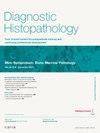Head and neck tumours with neuroendocrine marker ‘expression’: pitfalls and learning points
引用次数: 0
Abstract
Poorly differentiated carcinomas can be a challenging area for histopathologists and frequently require ancillary tests to arrive at a definitive diagnosis. Neuroendocrine markers have the potential to be helpful in establishing a diagnosis but can also cause diagnostic dilemmas when aberrantly expressed. Here, we present three case examples to illustrate this issue and highlight relevant learning points in each case.
头颈部肿瘤与神经内分泌标志物“表达”:陷阱和学习点
对于组织病理学家来说,低分化癌是一个具有挑战性的领域,经常需要辅助检查才能得到明确的诊断。神经内分泌标记物有可能有助于建立诊断,但当异常表达时也可能导致诊断困境。在这里,我们提供三个案例来说明这个问题,并强调每个案例中的相关学习点。
本文章由计算机程序翻译,如有差异,请以英文原文为准。
求助全文
约1分钟内获得全文
求助全文
来源期刊

Diagnostic Histopathology
Medicine-Pathology and Forensic Medicine
CiteScore
1.30
自引率
0.00%
发文量
64
期刊介绍:
This monthly review journal aims to provide the practising diagnostic pathologist and trainee pathologist with up-to-date reviews on histopathology and cytology and related technical advances. Each issue contains invited articles on a variety of topics from experts in the field and includes a mini-symposium exploring one subject in greater depth. Articles consist of system-based, disease-based reviews and advances in technology. They update the readers on day-to-day diagnostic work and keep them informed of important new developments. An additional feature is the short section devoted to hypotheses; these have been refereed. There is also a correspondence section.
 求助内容:
求助内容: 应助结果提醒方式:
应助结果提醒方式:


